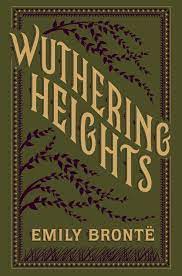Wuthering Heights Page #2
Wuthering Heights is an 1847 novel by Emily Brontë, initially published under the pseudonym Ellis Bell. It concerns two families of the landed gentry living on the West Yorkshire moors, the Earnshaws and the Lintons, and their turbulent relationships with Earnshaw's adopted son, Heathcliff.
By this curious turn of disposition I have gained the reputation of deliberate heartlessness; how undeserved, I alone can appreciate. I took a seat at the end of the hearthstone opposite that towards which my landlord advanced, and filled up an interval of silence by attempting to caress the canine mother, who had left her nursery, and was sneaking wolfishly to the back of my legs, her lip curled up, and her white teeth watering for a snatch. My caress provoked a long, guttural gnarl. “You’d better let the dog alone,” growled Mr. Heathcliff in unison, checking fiercer demonstrations with a punch of his foot. “She’s not accustomed to be spoiled—not kept for a pet.” Then, striding to a side door, he shouted again, “Joseph!” Joseph mumbled indistinctly in the depths of the cellar, but gave no intimation of ascending; so his master dived down to him, leaving me vis-à-vis the ruffianly bitch and a pair of grim shaggy sheep-dogs, who shared with her a jealous guardianship over all my movements. Not anxious to come in contact with their fangs, I sat still; but, imagining they would scarcely understand tacit insults, I unfortunately indulged in winking and making faces at the trio, and some turn of my physiognomy so irritated madam, that she suddenly broke into a fury and leapt on my knees. I flung her back, and hastened to interpose the table between us. This proceeding aroused the whole hive: half-a-dozen four-footed fiends, of various sizes and ages, issued from hidden dens to the common centre. I felt my heels and coat-laps peculiar subjects of assault; and parrying off the larger combatants as effectually as I could with the poker, I was constrained to demand, aloud, assistance from some of the household in re-establishing peace. Mr. Heathcliff and his man climbed the cellar steps with vexatious phlegm: I don’t think they moved one second faster than usual, though the hearth was an absolute tempest of worrying and yelping. Happily, an inhabitant of the kitchen made more dispatch; a lusty dame, with tucked-up gown, bare arms, and fire-flushed cheeks, rushed into the midst of us flourishing a frying-pan: and used that weapon, and her tongue, to such purpose, that the storm subsided magically, and she only remained, heaving like a sea after a high wind, when her master entered on the scene. “What the devil is the matter?” he asked, eyeing me in a manner that I could ill endure after this inhospitable treatment. “What the devil, indeed!” I muttered. “The herd of possessed swine could have had no worse spirits in them than those animals of yours, sir. You might as well leave a stranger with a brood of tigers!” “They won’t meddle with persons who touch nothing,” he remarked, putting the bottle before me, and restoring the displaced table. “The dogs do right to be vigilant. Take a glass of wine?” “No, thank you.” “Not bitten, are you?” “If I had been, I would have set my signet on the biter.” Heathcliff’s countenance relaxed into a grin. “Come, come,” he said, “you are flurried, Mr. Lockwood. Here, take a little wine. Guests are so exceedingly rare in this house that I and my dogs, I am willing to own, hardly know how to receive them. Your health, sir?” I bowed and returned the pledge; beginning to perceive that it would be foolish to sit sulking for the misbehaviour of a pack of curs; besides, I felt loth to yield the fellow further amusement at my expense; since his humour took that turn. He—probably swayed by prudential consideration of the folly of offending a good tenant—relaxed a little in the laconic style of chipping off his pronouns and auxiliary verbs, and introduced what he supposed would be a subject of interest to me,—a discourse on the advantages and disadvantages of my present place of retirement. I found him very intelligent on the topics we touched; and before I went home, I was encouraged so far as to volunteer another visit to-morrow. He evidently wished no repetition of my intrusion. I shall go, notwithstanding. It is astonishing how sociable I feel myself compared with him. CHAPTER II Yesterday afternoon set in misty and cold. I had half a mind to spend it by my study fire, instead of wading through heath and mud to Wuthering Heights. On coming up from dinner, however, (N.B.—I dine between twelve and one o’clock; the housekeeper, a matronly lady, taken as a fixture along with the house, could not, or would not, comprehend my request that I might be served at five)—on mounting the stairs with this lazy intention, and stepping into the room, I saw a servant-girl on her knees surrounded by brushes and coal-scuttles, and raising an infernal dust as she extinguished the flames with heaps of cinders. This spectacle drove me back immediately; I took my hat, and, after a four-miles’ walk, arrived at Heathcliff’s garden-gate just in time to escape the first feathery flakes of a snow shower. On that bleak hill top the earth was hard with a black frost, and the air made me shiver through every limb. Being unable to remove the chain, I jumped over, and, running up the flagged causeway bordered with straggling gooseberry-bushes, knocked vainly for admittance, till my knuckles tingled and the dogs howled. “Wretched inmates!” I ejaculated, mentally, “you deserve perpetual isolation from your species for your churlish inhospitality. At least, I would not keep my doors barred in the day-time. I don’t care—I will get in!” So resolved, I grasped the latch and shook it vehemently. Vinegar-faced Joseph projected his head from a round window of the barn. “What are ye for?” he shouted. “T’ maister’s down i’ t’ fowld. Go round by th’ end o’ t’ laith, if ye went to spake to him.” “Is there nobody inside to open the door?” I hallooed, responsively. “There’s nobbut t’ missis; and shoo’ll not oppen ’t an ye mak’ yer flaysome dins till neeght.” “Why? Cannot you tell her whom I am, eh, Joseph?” “Nor-ne me! I’ll hae no hend wi’t,” muttered the head, vanishing. The snow began to drive thickly. I seized the handle to essay another trial; when a young man without coat, and shouldering a pitchfork, appeared in the yard behind. He hailed me to follow him, and, after marching through a wash-house, and a paved area containing a coal-shed, pump, and pigeon-cot, we at length arrived in the huge, warm, cheerful apartment where I was formerly received. It glowed delightfully in the radiance of an immense fire, compounded of coal, peat, and wood; and near the table, laid for a plentiful evening meal, I was pleased to observe the “missis,” an individual whose existence I had never previously suspected. I bowed and waited, thinking she would bid me take a seat. She looked at me, leaning back in her chair, and remained motionless and mute. “Rough weather!” I remarked. “I’m afraid, Mrs. Heathcliff, the door must bear the consequence of your servants’ leisure attendance: I had hard work to make them hear me.”
Translation
Translate and read this book in other languages:
Select another language:
- - Select -
- 简体中文 (Chinese - Simplified)
- 繁體中文 (Chinese - Traditional)
- Español (Spanish)
- Esperanto (Esperanto)
- 日本語 (Japanese)
- Português (Portuguese)
- Deutsch (German)
- العربية (Arabic)
- Français (French)
- Русский (Russian)
- ಕನ್ನಡ (Kannada)
- 한국어 (Korean)
- עברית (Hebrew)
- Gaeilge (Irish)
- Українська (Ukrainian)
- اردو (Urdu)
- Magyar (Hungarian)
- मानक हिन्दी (Hindi)
- Indonesia (Indonesian)
- Italiano (Italian)
- தமிழ் (Tamil)
- Türkçe (Turkish)
- తెలుగు (Telugu)
- ภาษาไทย (Thai)
- Tiếng Việt (Vietnamese)
- Čeština (Czech)
- Polski (Polish)
- Bahasa Indonesia (Indonesian)
- Românește (Romanian)
- Nederlands (Dutch)
- Ελληνικά (Greek)
- Latinum (Latin)
- Svenska (Swedish)
- Dansk (Danish)
- Suomi (Finnish)
- فارسی (Persian)
- ייִדיש (Yiddish)
- հայերեն (Armenian)
- Norsk (Norwegian)
- English (English)
Citation
Use the citation below to add this book to your bibliography:
Style:MLAChicagoAPA
"Wuthering Heights Books." Literature.com. STANDS4 LLC, 2025. Web. 15 Jan. 2025. <https://www.literature.com/book/wuthering_heights_1627>.




Discuss this Wuthering Heights book with the community:
Report Comment
We're doing our best to make sure our content is useful, accurate and safe.
If by any chance you spot an inappropriate comment while navigating through our website please use this form to let us know, and we'll take care of it shortly.
Attachment
You need to be logged in to favorite.
Log In